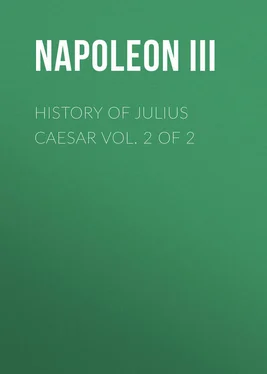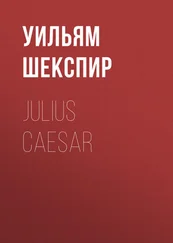Napoleon III - History of Julius Caesar Vol. 2 of 2
Здесь есть возможность читать онлайн «Napoleon III - History of Julius Caesar Vol. 2 of 2» — ознакомительный отрывок электронной книги совершенно бесплатно, а после прочтения отрывка купить полную версию. В некоторых случаях можно слушать аудио, скачать через торрент в формате fb2 и присутствует краткое содержание. Жанр: foreign_antique, foreign_prose, Биографии и Мемуары, на английском языке. Описание произведения, (предисловие) а так же отзывы посетителей доступны на портале библиотеки ЛибКат.
- Название:History of Julius Caesar Vol. 2 of 2
- Автор:
- Жанр:
- Год:неизвестен
- ISBN:нет данных
- Рейтинг книги:4 / 5. Голосов: 1
-
Избранное:Добавить в избранное
- Отзывы:
-
Ваша оценка:
- 80
- 1
- 2
- 3
- 4
- 5
History of Julius Caesar Vol. 2 of 2: краткое содержание, описание и аннотация
Предлагаем к чтению аннотацию, описание, краткое содержание или предисловие (зависит от того, что написал сам автор книги «History of Julius Caesar Vol. 2 of 2»). Если вы не нашли необходимую информацию о книге — напишите в комментариях, мы постараемся отыскать её.
History of Julius Caesar Vol. 2 of 2 — читать онлайн ознакомительный отрывок
Ниже представлен текст книги, разбитый по страницам. Система сохранения места последней прочитанной страницы, позволяет с удобством читать онлайн бесплатно книгу «History of Julius Caesar Vol. 2 of 2», без необходимости каждый раз заново искать на чём Вы остановились. Поставьте закладку, и сможете в любой момент перейти на страницу, на которой закончили чтение.
Интервал:
Закладка:
Siege of the Oppidum of the Aduatuci.
VIII. This victory was gained, no doubt, towards the end of July. Cæsar detached the 7th legion, under the orders of young P. Crassus, to reduce the maritime peoples of the shores of the ocean: the Veneti, the Unelli, the Osismii, the Curiosolitæ, the Essuvii, the Aulerci, and the Redones. He proceeded in person, with the seven other legions, following the course of the Sambre, to meet the Aduatuci, who, as we have seen above, were marching to join the Nervii. They were the descendants of those Cimbri and Teutones who, in their descent upon the Roman province and Italy in the year 652, had left on this side the Rhine 6,000 men in charge of as much of the baggage as was too heavy to be carried with them. After the defeat of their companions by Marius, and many vicissitudes, these Germans had established themselves towards the confluence of the Sambre and the Meuse, and had there formed a state.
As soon as the Aduatuci were informed of the disaster of the Nervii, they returned to their own country, abandoned their towns and forts, and retired, with all they possessed, into one oppidum , remarkably fortified by nature. Surrounded in every direction by precipitous rocks of great elevation, it was accessible only on one side by a gentle slope, at most 100 feet wide, defended by a fosse and double wall of great height, on which they placed enormous masses of rock and pointed beams. The mountain on which the citadel of Namur is situated 268answers sufficiently to this description. ( See Plate 11. )
On the arrival of the army, they made at first frequent sorties, and engaged in battles on a small scale. Later, when the place was surrounded by a countervallation of twelve feet high in a circuit of 15,000 feet, 269with numerous redoubts, they kept close in their oppidum . The Romans pushed forward their covered galleries, raised a terrace under shelter of these galleries, and constructed a tower of timber, intended to be pushed against the wall. At the sight of these preparations, the Aduatuci, who, like most of the Gauls, despised the Romans on account of their small stature, addressed the besiegers ironically from their walls, not understanding how a great machine, placed at a great distance, could be put in motion by men so diminutive. But when they saw this tower move and approach the walls, struck with a sight so strange and so new to them, they sent to implore peace, demanding, as the only condition, that they should be left in possession of their arms. Cæsar refused this condition, but declared that, if they surrendered before the ram had struck their wall, they should be placed, like the Nervii, under the protection of the Roman people, and preserved from all violence. The besieged thereupon threw such a quantity of arms into the fosses that they filled them almost to the height of the wall and the terrace; yet, as was afterwards discovered, they had retained about one-third. They threw open their gates, and that day remained quiet.
The Romans had occupied the town; towards evening, Cæsar ordered them to leave it, fearing the violences which the soldiers might commit on the inhabitants during the night. But these, believing that after the surrender of the place the posts of the countervallation would be guarded with less care, resume the arms they had concealed, furnish themselves with bucklers of bark of trees, or wicker, covered hastily with skins, and, at midnight, attack the part of the works which seems most easy of access. Fires, prepared by Cæsar, soon announce the attack. The soldiers rush to the spot from the nearest redoubts; and, though the enemies fight with the obstinacy of despair, the missiles thrown from the entrenchments and the towers disperse them, and they are driven back into the town with a loss of 4,000 men. Next day the gates were broken in without resistance, and, the town once taken, the inhabitants were sold publicly to the number of 53,000. 270
Subjugation of Armorica by P. Crassus
IX. Towards the time of the conclusion of this siege (the first days of September), Cæsar received letters from P. Crassus. This lieutenant announced that the maritime peoples on the coasts of the ocean, from the Loire to the Seine, had submitted. On the arrival of this news at Rome, the Senate decreed fifteen days of thanksgivings. 271
These successful exploits, and Gaul entirely pacified, gave to the barbarian peoples so high an opinion of the Roman power, that the nations beyond the Rhine, particularly the Ubii, sent deputies to Cæsar, offering hostages and obedience to his orders. Anxious to proceed to Italy and Illyria, he commanded the deputies to return to him at the commencement of the following spring, and placed his legions, with the exception of the 12th, in winter quarters, in the countries of the Carnutes, the Andes, and the Turones, neighbouring upon the localities where Crassus had been making war. 272They were probably échelonnés in the valley of the Loire, between Orleans and Angers.
Expedition of Galba into the Valais.
X. Before he departed for Italy, Cæsar sent Servius Galba, with a part of the cavalry and the 12th legion, into the country of the Nantuates, the Veragri, and the Seduni ( peoples of Chablais and Lower and Upper Valais ), whose territory extended from the country of the Allobroges, Lake Léman, and the Rhone, to the summit of the Alps. His object was to open an easy communication with Italy by way of these mountains, that is, by the Simplon and the St. Bernard, where travellers were continually subject to exactions and vexations. Galba, after some successful battles, by which all these peoples were subdued, obtained hostages, placed two cohorts among the Nantuates, and the rest of his legions in a town of the Veragri called Octodurus ( Martigny ). This town, situated in a little plain at the bottom of a glen surrounded by high mountains, was divided into two parts by a river ( the Drance ). Galba left one bank to the Gauls, and established his troops on the other, which he fortified with a fosse and rampart.
Several day had passed in the greatest tranquillity, when Galba learnt suddenly that the Gauls had during the night evacuated the part of the town which they occupied, and that the Veragri and the Seduni were appearing in great numbers on the surrounding mountains. The situation was most critical; for not only could Galba reckon on no succour, but he had not even finished his retrenchments, or gathered in his provisions in sufficient quantity. He called together a council, in which it was decided, in spite of the opinions of some chiefs, who proposed to abandon the baggage and fight their way out, that they should defend the camp; but the enemies hardly gave the Romans time to make the necessary dispositions. Suddenly they rush from all sides towards the retrenchments, and throw a shower of darts and javelins ( gæsa ). Having to defend themselves against forces which are continually renewed, they are obliged to fight all at once, and to move incessantly to the point that are most threatened. The men who are fatigued, and even the wounded, cannot quit the place. The combat had lasted six hours: the Romans were exhausted with fatigue. Already they began to be short of missiles; already the Gauls, with increasing audacity, were filling up the fosse and tearing down the palisades; already the Romans were reduced to the last extremity, when the primipilus, P. Sextius Baculus, the same who had shown so much energy in the battle of the Sambre, and C. Volusenus, tribune of the soldiers, advise Galba that the only hope which remained was in a sally. The suggestion is adopted. At the command of the centurions, the soldiers confine themselves to parrying the missiles, and take breath; then, when the signal is given, rushing on all sides to the gates, they fall upon the enemy, put him to rout, and make an immense slaughter. Of 30,000 Gauls, about 10,000 were slain. [273]In spite of this, Galba, not believing himself in safety in so difficult a country, in the midst of hostile populations, brought back the 12th legion into the country of the Allobroges, where it wintered. [273a]
Читать дальшеИнтервал:
Закладка:
Похожие книги на «History of Julius Caesar Vol. 2 of 2»
Представляем Вашему вниманию похожие книги на «History of Julius Caesar Vol. 2 of 2» списком для выбора. Мы отобрали схожую по названию и смыслу литературу в надежде предоставить читателям больше вариантов отыскать новые, интересные, ещё непрочитанные произведения.
Обсуждение, отзывы о книге «History of Julius Caesar Vol. 2 of 2» и просто собственные мнения читателей. Оставьте ваши комментарии, напишите, что Вы думаете о произведении, его смысле или главных героях. Укажите что конкретно понравилось, а что нет, и почему Вы так считаете.












